How to Spot a Puppy Mill: A Complete Guide
By Mawoo Pets · 10 min read
Last updated: January 27th, 2024
The last thing any dog lover wants to do is support the ethical minefield that is a puppy mill. But - how are you supposed to find a great new puppy without worrying that it comes from a bad breeder? The best way to make sure your dog is healthy, socialized and comes from a good place is to watch out for the warning signs of a backyard breeder.
What Is a Puppy Mill?
First, it’s important to know, just what it is a puppy mill?
Puppy mills don’t all look the same, but what they have in common is the motivation of money versus the motivation of creating healthy, happy dogs and matching them with good owners.
Purebred puppies and grown dogs are worth a lot of money, which convinces many people that they should start breeding puppies in their backyard or spare room. Cramped conditions get dirty fast, and without experienced carers, puppies and their parents suffer from a lack of socialization and exercise.
A reputable breeder cares for their puppies and breeding animals well, ensuring they have the right nutrition, training, space and veterinary care in all stages of life.
Good breeders love and respect their dogs. Puppy mill breeders may or may not actually care for dogs, since their main objective is to make some easy cash with as little invested time and money as possible.
Why Are Puppy Mills Bad?
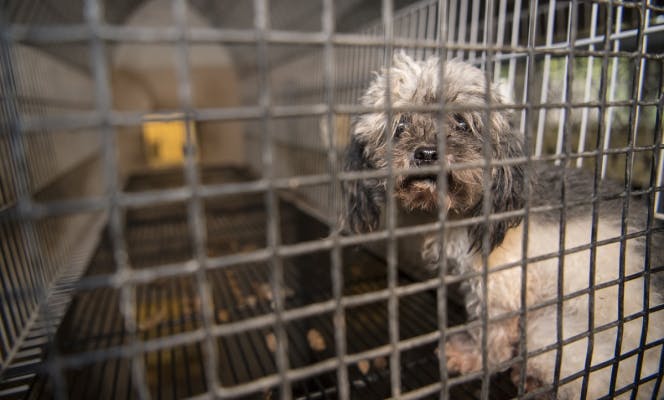
Photo by Meredith Lee/The HSUSThere are many reasons not to trust or do business with puppy mills.
They have poorly kept facilities which risk the health and happiness of the dogs, and unethical business practices that lead to the sale of falsely advertised puppies. Good breeders track each dog in every family line and register them with top clubs like the Canadian Kennel Club, the American Kennel Club or the United Kennel Club, so you can track their lineage.
Puppy mills are created when someone uses their dog to have as many puppies as possible. Right from the start, this puts far too much stress on mama dog, who should ideally become pregnant no more than three times during her life. More pregnancies lead to health problems and general exhaustion for a doggy mother.
Good breeders will work with veterinarians to determine when a dog should and should not become pregnant—puppy mills will not.
Puppy mills just breed dogs until they can’t produce any more, then get rid of them. It’s not a respectful and loving situation. Retired breeding dogs need good homes too, and if they aren’t kept by their original kennel, they need to be adopted out to family homes to enjoy their senior years in happiness and peace.
Another reason to avoid puppy mills is that their facilities are too small to comfortably house the number of dogs in their care. Dogs kept in small cages can often develop anxiety and anti-social behaviour. And it’s difficult to keep small kennels sanitary, which makes it easy for the dogs to develop infections or get sick from the lack of fresh food and water.
How Do You Spot a Puppy Mill?
Keep your eyes open for the following signs of unethical breeding practices whenever you are looking for a new puppy.
1. Not Allowed to See Facility
This is a great big warning sign! Normally, breeders are happy to arrange a visit with prospective puppy owners and their available dogs. Good breeders are proud of their facilities and love to show off their special doggies. If you’re denied entry, it may well be due to unclean, unethical facilities.
2. Facility Is Dirty
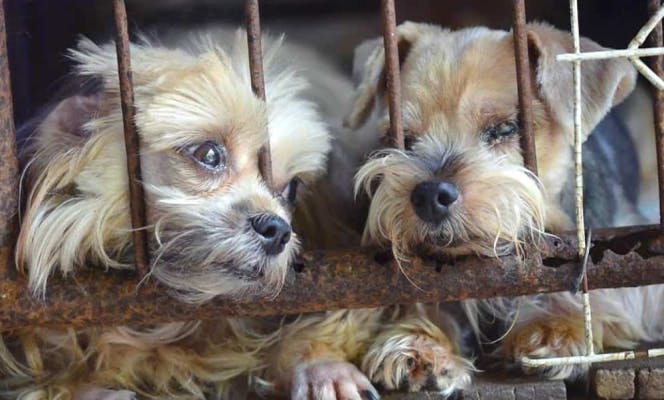
Anyone who works with animals knows that they are messy! One of the most difficult things for a breeder, kennel or animal rescue group to do is keep the animals and grounds clean and smelling fresh. It’s okay to give them some leeway in terms of keeping things tidy, but your overall impression of the facility should be positive. You shouldn’t be wading through poo and covering your nose the whole time, trying not to breathe in the smell.
3. Animals Are Unhealthy, Aggressive or Depressed
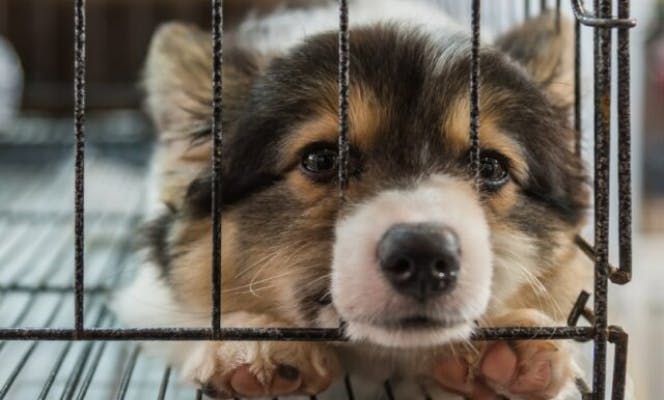
All animals are different, just like people. Some have a little anxiety about crowds, while others get overexcited about meeting new people. You’ll meet dogs with a few personality types when you visit a breeder in person, but those dogs shouldn’t seem overly fearful or aggressive. Depressed dogs are also a sign that something isn’t right — and sign that you may have spotted a puppy mill.
Normal socialization between dogs—as well as between dogs and people—needs to take place from puppyhood so animals have a healthy amount of confidence. Handlers should introduce new puppy families to other batches as soon as they are able to safely meet one another. Daily handling by humans plus interactions with other dogs naturally helps puppies learn the rules of doggy and people socialization.
4. The Parents Aren’t There to Meet You
When puppies are available for sale from a good breeder, you can usually meet their doggy parents on site at the facility. Even if the papa isn’t available at the same location, mama dog will be. If neither parent lives in the same place as the puppies, take it as a potential warning sign for unethical practices. Consider this: Why wouldn’t puppies live with their mother, if they aren’t rescued orphans? They could be stolen or bought cheaply to try to resell at top dollar, despite no breeding history.
5. Puppy Lacks Vaccinations or Health certificate
It’s normal practice for breeders to provide their puppies with all recommended vaccinations and health checks. If you were to buy a puppy from a reputable dog breeder, you should expect to be given a health certificate from a veterinarian that promises the puppy has been properly vetted.
A lack of good vet care signifies that a breeder hasn’t invested in the health of its dogs, and maybe doesn’t care all that much about the animals in their care. They may have avoided extra expenses by keeping their dogs away from the veterinarian, but those are costs that can have a serious impact on puppies’ health later on.
6. Seller Has Too Many Different Breeds for Sale
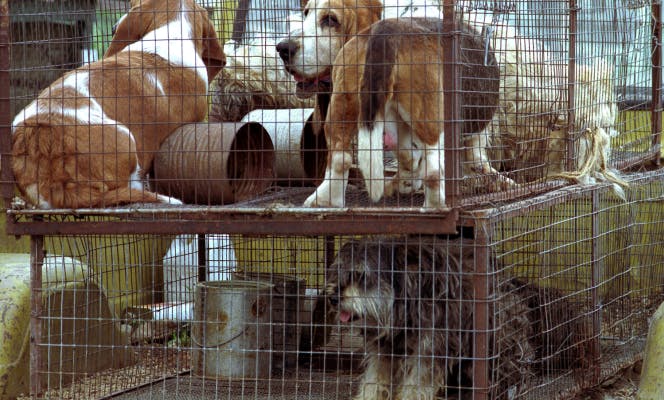 Image source: tiffinohio.net
Image source: tiffinohio.net
In theory, there’s nothing wrong with breeding multiple types of dogs! It makes sense from a marketing perspective. In reality, however, the costs and labour involved in properly breeding just one type of dog are intense. Think about it like a restaurant with a huge menu that includes several different types of cuisine. Often, that’s a sign that the food quality is sub-par since the chef doesn’t have time to focus on making a few great dishes.
It’s very difficult to provide enough space and hands-on care for multiple breeding pairs of dogs, plus multiple batches of puppies, all at once. Most breeders’ facilities don’t have that kind of space, nor that many people available to care for the dogs with food, water, cleaning, training and exercise every day.
7. Puppies Can Be Taken Home Before 8 Weeks of Age

Ask any veterinarian when it’s safe to take a new puppy away from its mother and they’ll tell you no less than 6 weeks. As for putting that puppy in a new home, 8 weeks is the age generally agreed on by professionals. Some breeders even enforce 10 weeks, for instance for very small breeds that needs to spend more time with their mom.
There are many things a young dog needs to learn from its mother and family members before leaving home, including proper doggy social behaviour. If the breeder is willing to let go of a pup before 8 weeks, that sign of a puppy mill breeder.
8. Seller Has Puppies for Sale at Different Ages
There are a few reasons why a breeder with puppies of different ages raises a red flag. First, were those older puppies purchased and then returned for some reason? Or, are the dogs not being bought because of a problem with the contract or their health?
An experienced breeder will usually focus on one batch of puppies at a time, whereas an irresponsible breeder will simply create as many puppies as possible all at once. The fewer puppies available, the more care and attention they potentially receive.
9. Seller Doesn’t Provide Any Support After Sale
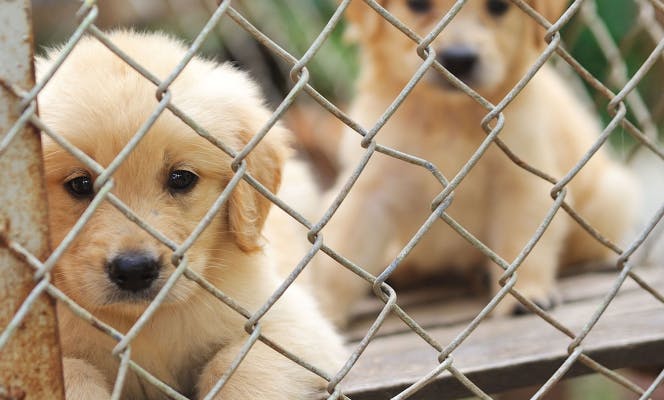 Dog lovers can spend thousands of dollars on a purebred puppy, which is why good breeders provide health guarantees on their dogs. It’s an agreement between the owner and the seller that means if a dog becomes sick or dies within a certain amount
of time, the owner will be compensated. In most cases, breeders will help with veterinary bills or offer to replace the puppy. Not doing this are signs of a puppy mill or unethical breeding.
Dog lovers can spend thousands of dollars on a purebred puppy, which is why good breeders provide health guarantees on their dogs. It’s an agreement between the owner and the seller that means if a dog becomes sick or dies within a certain amount
of time, the owner will be compensated. In most cases, breeders will help with veterinary bills or offer to replace the puppy. Not doing this are signs of a puppy mill or unethical breeding.
10. Seller Doesn’t Ask You Any Questions
Breeders put a lot of time and effort into breeding dogs and raising puppies. They love their dogs and bond with them from birth, just like pet owners. You can imagine, then, how difficult it is to let go of every cherished puppy when they are bought by a new owner.
To make sure their little darlings are going off into the world with the best new families, breeders tend to ask potential owners a lot of questions. They usually want to know where you live, whether you have other dogs, and if this is your first experience with a particular breed. They may even want to visit your home to check your own facilities!
It’s understandable, then, that a breeder who asks nothing of a potential owner is abnormal. You have to ask yourself, as an animal lover, why don’t they care where their sweet puppy is going? Does this lack of emotion mean the puppy—and its family members—have received poor care all along? It can certainly point to the possibility of an uncaring or puppy mill breeder.
Are Puppy Mills Illegal?
Puppy mills are not necessarily illegal in every region, partly because there is no one definition that suits every instance of unethical dog breeding. Many laws have been passed to try to crack down on this type of business, but many people still manage to sneak past legislative measures.
It’s up to all of us to keep our eyes open for the types of abuses that happen at puppy mills, and to make sure our own dogs come from reputable businesses.
How Do I Report a Puppy Mill?
The Humane Society is dedicated to ridding the world of unethical breeding businesses.
In the United States, you can contact the Humane Society at 1-877-MILL-TIP to report a puppy mill. This organization offers a $5,000 reward for any information that leads to the arrest and conviction of someone running a puppy mill.
If you suspect a puppy mill in Canada, you can report it to your provincial Humane Society. In Ontario, you can also reach out to the Ontario Animal Protection Call Centre at 1-833-9-ANIMAL.
How Can I Find a Puppy from a Good Breeder?
When looking for your own new puppy, look for a breeder with a great reputation. Try to find someone who loves their dogs and is excited to let you meet them! Be sure that any puppy you purchase includes a health certificate for each puppy, documentation for each breeding animal, and a formal application process.
If you aren’t sure where to begin, take a minute to fill out our Dog Breed Quiz and see which breeds and available puppies match your lifestyle best.
Related articles
Any questions? Get in touch!
We are here to support you every step of the way. Our concierge service is here daily to answer your questions!
Chat or speak with our team Mon-Sat 9a-9p ET.






